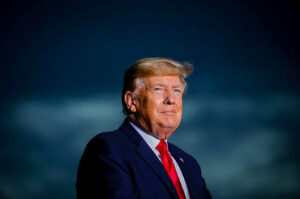After John Kerry stepped down from his role as Biden’s climate envoy, another Democratic stalwart was bound to take his place. Enter John Podesta, a consummate Washington insider and veteran of the last three Democratic presidencies. Already an overseer of the $370 billion in spending authorised by the Inflation Reduction Act, the strategist now finds himself at the very intersection of the administration’s foreign and domestic policies.
Yet for someone who’s held so much power for so long, it’s important to remember that Podesta has never been an elected official and has instead relied on his close proximity to the formal holders of authority to sustain his rank. Presidents have come and gone, but Podesta remains, always near the top, dispensing advice on both matters of policy and partisanship. He is, in other words, a modern-day courtier, and the courtier’s pursuit of power is an art that Podesta has all but perfected.
Podesta first emerged on the national scene in the Nineties, as Bill Clinton’s chief of staff. He was instrumental in realising that administration’s “Third Way” project, the central tenet of which was the neoliberal faith in deregulated markets and trade integration with rising industrial powers like China, who took the lion’s share of subsequent world manufacturing growth. Today, he plays a comparable role in executing the President’s economically nationalist “Bidenomics” agenda — the dialectical opposite of neoliberalism. He is, in effect, reversing the liberalising thrust of the Clinton years and positioning the US to compete once again with strategic rivals (like, say, China). It is almost a tacit admission that Podesta helped to create a series of problems in one administration, and has returned to fix them in another.
This seemingly breathless inversion, on the part of Podesta and his party, raises several questions. Is it the result of ruthless political opportunism, or an agile and creative pragmatism — or both? And what does it all say about America’s liberal ruling class, in particular the privileged caste of courtiers within it? The answers, I suspect, may lie in philosopher John Ralston Saul’s notion of the “rational courtier”, which he employed, in his 1992 magnum opus Voltaire’s Bastards: The Dictatorship of Reason in the West, to examine the breed of political technocrats who arose in the post-war era and who have since come to enjoy total hegemony over most institutions.
Written at the dawn of the globalised era, Voltaire’s Bastards was a prophetic warning about the excesses not just of the neoliberal economic regime but of the underlying mode of disembodied, instrumental reason that its apparatchiks practised. The result of this marriage of cold reason and raw power was a new incarnation of an old archetype, one who fused the clandestine, self-serving intrigues of an aristocrat at Versailles with all the expertise of a Harvard MBA (or, in Podesta’s case, a Georgetown JD). As Saul wrote: “The modern technocrat and the royal courtier are virtually indistinguishable… Taken together, they form a group, a class, a type, linked by a particular sort of intelligence involving their central talents as systems men… who create and work principally within and through the system of which they are emanations.”
Throughout the past century, such rational courtiers were present in both parties: Saul cites Robert McNamara, Henry Kissinger, and James Baker as examples. They were already far cry from Baldassare Castiglione’s Renaissance ideal, laid out in the Book of the Courtier: a versatile humanist statesman who drew on a broad range of virtues to provide wise counsel and point his prince toward justice. Instead, these figures submerged that ideal “beneath the growing need to prove everything by means of what were coming to be known as facts”, drawing exclusively on the “innate mechanical and logical talents which link our new men of power together”. This was the Book of the Courtier, but authored by Sir Humphrey Appleby.
In this view, loyalty to particular persons, causes or ideologies becomes anachronistic. The courtier can alter his professed allegiances as casually as he changes neckties since his energies are really dedicated to preserving systems and his place within it, a field of rational administration that exists aloof from the plane of politics. Understood this way, Podesta’s seamless shift from one paradigm to another makes sense. Just as the rational courtiers survived (and thrived) in the transition from post-war Keynesianism to neoliberalism, so too will they find niches for themselves in the move toward a new form of economic nationalism. As any rational courtier can say: political movements rise and fall; only power is constant — and reason is the currency of that power.
A big difference today is that, thanks to a process of polarisation along the lines of class and credentials, the Democrats have become the new home of this class. And in very many ways, Podesta and his party’s flexibility on political economy is a positive development. It shows that the courtiers are responsive to changing times and that they might even be as rational as they claim. But as Saul warned in Voltaire’s Bastards, the blind exercise of reason, used as both a means and an end, always carries externalities. Beneath the courtiers’ impressive veneer of technical excellence lies a callous indifference to the social and human dimensions of any great enterprise. Looking closely at Podesta’s trajectory from free trader to neomercantilist can confirm as much.
The trend of financialisation, by which Wall Street would be unshackled from Depression-era regulations, reached its climax with the 1999 repeal of the Glass-Steagall Act. A White House memo dated from 1995 showed Podesta to be one of the more eager proponents, writing: “The argument for reform is that the separation between banking and other financial services… is out of date in a world where banks, securities firms and insurance companies offer similar products and where firms outside the US do not face such restrictions.”
But perhaps more important was the Clinton administration’s support for China’s accession to the World Trade Organization. We can detect Podesta’s hand there too. At an event held in May 2000 to raise support for permanent normal trade relations with China, Podesta was front and centre in declaring that: “We have absolutely nothing to lose.” He assured Americans that “bringing China into the WTO will actually help the cause of human rights in China, by opening China up to new technology, more Internet access, more sources of information”. Podesta spoke then with the boundless confidence of a rational courtier who had reached the pinnacle of power, with the weight of the experts and their conventional wisdom behind him.
It should have been the first sign that hubris had set in and that a reckoning was near. Now, it is clear that on both counts, financialisation and free trade with China, Podesta and nearly all the era’s rational courtiers were dead wrong. In their rush to become more neoliberal than the Republicans, the Democrats enabled what has come to be known as “The China Shock”: the hollowing out of American manufacturing, along with the growth of massive inequality at home and the empowerment of an illiberal Chinese regime that has only grown more brazen in its authoritarian tendencies.
And yet, as the current administration now seeks to reverse globalisation and bolster America’s industrial capacities against a resurgent Beijing, it has turned to the very same John Podesta to save the day. Neither his failure to foresee catastrophe as an advisor to Bill Clinton and Barack Obama, nor his embarrassing blunders as the head of Hillary Clinton’s disastrous campaign managed to dull his lustre within the party or to pull him away from the centres of power. The mark of a mandarin whose fate has become one with that of the system he inhabits.
Being such an expert courtier, Podesta knows how to change his tune on policy — but he could not change his tone, arguing for economic nationalism with the same boundless confidence as when he once shilled for neoliberalism. There is thus no hint of acknowledgment or contrition for the gravity of his past mistakes, or for the traumatic social dislocations caused by the China Shock. Neither is there much humility in Podesta’s recent pronouncements as he displays the same reflexive deference to the dictates of expertise, without considering the potential limits of such an exceedingly rational approach to politics. It is no surprise to see that Bidenomics, for all its economic ambition, continues to be a political dud. It also fails at the level of totality: the rational approach that’s been applied to industrial policy has not been applied to immigration and the border, where the logic of economic nationalism has been ignored altogether.
In the sequel to Voltaire’s Bastards, Saul suggests that the antidote to the dictatorship of reason is a return to “equilibrium”, that is the rebalancing of rationality with other positive qualities of the human condition, hewing closer perhaps to the well-rounded Renaissance ideal of Castiglione. But leaders of this kind and calibre are nowhere to be seen in contemporary America. Instead, there is continued polarisation between individuals like Podesta in the liberal ruling class and the antithetical figure in the opposition party, someone like Trump advisor Peter Navarro, who embodies an archetype that might instead be called the “romantic courtier”. Unlike his rational rival, this character cleaves to a premodern understanding of politics and suffers from the opposite defect, namely an excess of loyalty and devotion to his liege, often to the detriment of more practical concerns.
American politics may thus be reduced to a difficult choice: the clever tyranny of Podesta types, or the earnest but erratic government of his romantic counterpart. Until the return of statesmanship in either party, the world’s greatest democracy, like decadent late-Bourbon France or eunuch-ridden Qing China, is effectively condemned to live under the rule of courtiers.
Disclaimer
Some of the posts we share are controversial and we do not necessarily agree with them in the whole extend. Sometimes we agree with the content or part of it but we do not agree with the narration or language. Nevertheless we find them somehow interesting, valuable and/or informative or we share them, because we strongly believe in freedom of speech, free press and journalism. We strongly encourage you to have a critical approach to all the content, do your own research and analysis to build your own opinion.
We would be glad to have your feedback.
Source: UnHerd Read the original article here: https://unherd.com/



